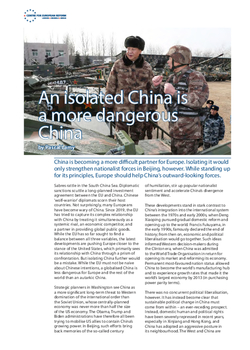
An isolated China is a more dangerous China
China is becoming a more difficult partner for Europe. Isolating it would only strengthen nationalist forces in Beijing, however. While standing up for its principles, Europe should help China’s outward-looking forces.
Sabres rattle in the South China Sea. Diplomatic sanctions scuttle a long-planned investment agreement between the EU and China. Chinese 'wolf-warrior' diplomats scorn their host countries. Not surprisingly, many Europeans have become wary of China. Since 2019, the EU has tried to capture its complex relationship with China by treating it simultaneously as a systemic rival, an economic competitor, and a partner in providing global public goods. While the EU has so far sought to find a balance between all three variables, the latest developments are pushing Europe closer to the stance of the United States, which primarily sees its relationship with China through a prism of confrontation. But isolating China further would be a mistake. While the EU must not be naive about Chinese intentions, a globalised China is less dangerous for Europe and the rest of the world than an autarkic China.
Since 2019, the EU has tried to capture its complex relationship with China by treating it simultaneously as a systemic rival, an economic competitor, and a partner in providing global public goods.
Strategic planners in Washington see China as a more significant long-term threat to Western domination of the international order than the Soviet Union, whose centrally-planned economy was never more than half the size of the US economy. The Obama, Trump and Biden administrations have therefore all been trying to mobilise US allies to contain China’s growing power. In Beijing, such efforts bring back memories of the so-called century of humiliation, stir up popular nationalist sentiment and accelerate China’s divergence from the West.
These developments stand in stark contrast to China’s integration into the international system between the 1970s and early 2000s, when Deng Xiaoping pursued gradual domestic reform and opening up to the world. Francis Fukuyama, in the early 1990s, famously declared the end of history; from then on, economic and political liberalisation would go together. Such ideas informed Western decision-makers during the Clinton era, when China was admitted to the World Trade Organisation in return for opening its market and reforming its economy. Permanent most-favoured nation status allowed China to become the world’s manufacturing hub and to experience growth rates that made it the world’s largest economy by 2013 (in purchasing power parity terms).
There was no concurrent political liberalisation, however. It has instead become clear that sustainable political change in China must come from within – an ever-receding prospect. Instead, domestic human and political rights have been severely repressed in recent years, especially in Xinjiang and Hong Kong, and China has adopted an aggressive posture in its neighbourhood. The West and China are increasingly on a path of systemic rivalry. As a result, both China and the US are encouraging the diversification of supply chains – in other words, decoupling to lessen economic interdependence. This has been particularly evident in the technology sector, where security issues, data regimes and competition dynamics are most sensitive.
But there is a mismatch between the political imperatives for economic decoupling and the business reality, particularly for European firms. These are much more dependent on the Chinese market than their US counterparts. Eleven per cent of EU exports go to China, compared with just 6 per cent of American exports. With a ratio of exports to GDP of 44 per cent, the EU member-states are also nearly four times more dependent on exports than the US, which only has an exports-to-GDP ratio of 12 per cent.
Whether or not China’s Sonderweg outside global liberal market capitalism is a sustainable model remains uncertain. A growing demographic burden, historically high levels of public debt, rising labour costs, and a real estate bubble are all testing the system. But reports of the Chinese model’s imminent death have been greatly exaggerated for years: China’s GDP growth has continued to be about triple the OECD average. For now, a significant presence in the Chinese market remains key to the international competitiveness of most large firms. Despite mounting political tensions, European companies continue to increase their investments in China. According to a recent survey, almost one-third of European companies operating in China increased their shares in joint ventures, and two-thirds took full ownership or a controlling stake in 2020.
But there are qualitative differences, depending on what is being traded. Goods are, for the most part, ideologically neutral. Digital services, on the other hand, are deeply intertwined with political values. The recent moves by the Chinese Communist Party (CCP) to increase control over China’s domestic technology sector and the withdrawal of LinkedIn from the Chinese market underline that the free circulation of information and open cross-border data flows are incompatible with authoritarian governance. In the medium term, the CCP’s political compulsions may make its technology firms less and less competitive, stalling China’s push to increase the export of digital services. As most future economic growth will come from this sector, China could fall into the middle-income trap.
The EU would be well-advised not to play into the hands of those in China who want to isolate the country from the rest of the world.
Whether or not that transpires, the EU would be well-advised not to play into the hands of those in China who want to isolate the country from the rest of the world. Most Europeans have learned from the history of the 20th century that a dark path lies ahead when countries cut their ties to the rest of the world in a jingoist frenzy. World War One serves as a reminder that interdependence is not a sufficient condition for peace. But economic integration can be a vital guardrail whenever great power politics leads political leaders down a dangerous slope.
Europe must be clear-sighted about China’s direction of travel. It must not repeat the mistakes of 20th century appeasement, but stand shoulder to shoulder with other democracies to defend human rights and the rule of law. However it should co-operate with China to address shared global challenges. Any political solution to crucial issues for the future of the planet, in particular climate change and marine biodiversity, would be meaningless without the participation of the world’s largest economy.
Moreover, reciprocal market access and a level playing-field for the exchange of goods, services or capital will not only continue to benefit EU consumers and industry, but will also strengthen the outward-looking forces in China that interact with the rest of the world. They will have a material stake in continued co-operation and are more open to outside ideas and values. Efforts by the EU to encourage some firms to diversify their supply chains should be restricted to narrowly defined sectors of strategic importance, where it is absolutely necessary to reduce one-way dependence. Because of the specific character of the digital domain, the EU should also link its political values more explicitly to cross-border data flows, and consider offering digital market access only on a reciprocal basis. That would incentivise China (and others) to rethink their current approach to data governance or risk becoming uncompetitive in the digital economy.
Lastly, the EU should support China’s equitable access to key mechanisms of global governance. This includes the long-overdue quota reform at the International Monetary Fund, which would support China’s integration into the existing international order and discourage it from establishing or bolstering alternative governance arrangements. Taken together, these measures would help to support those in China who look outward rather than the nationalist forces that are the most likely threat to global peace and prosperity.
This is based on a report to be published by the Jacques Delors Institute (Paris).
Pascal Lamy is co-ordinator of the Jacques Delors Institute network, and a member of the CER’s advisory board.

